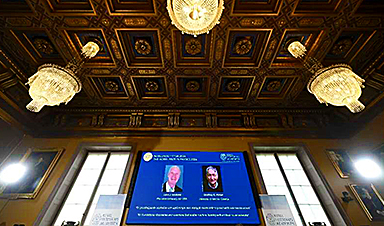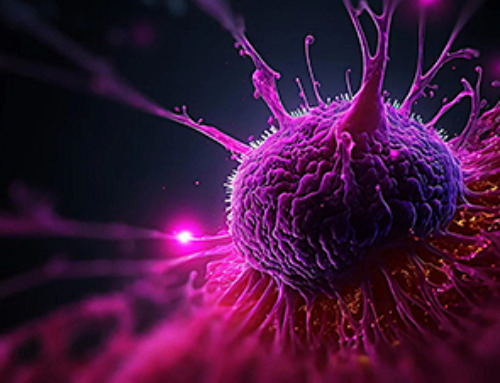For long periods of its history, artificial intelligence has lurked in the hinterland of science, often unloved and unfunded—but two Nobel prizes in one week suggest its time in the sunshine has finally arrived.
First on Tuesday, Geoffrey Hinton and John Hopfield won the physics prize for their pioneering work in creating the foundations of modern AI.
Then on Wednesday, David Baker, John Jumper and Demis Hassabis shared the chemistry prize for work revealing the secrets of proteins through AI.
While the trio had been among the favorites for the chemistry prize, the physics one was unexpected.
“I’m flabbergasted,” said Hinton when he was told of the prize. “I had no idea this would happen. I’m very surprised.”
He wasn’t the only one.
Online commentators wondered why a computer scientist was getting a physics prize.
And with programs such as OpenAI’s ChatGPT dominating the cultural conversation around AI, for many the idea that such a technology could be worthy of such an award seemed bizarre.
‘AI winter’
But for scientists the news was not so surprising.
“AI’s role in transforming how we do science cannot be underestimated,” Elena Simperl, a professor at King’s College London’s informatics department, told AFP.
“The Nobel prize news recognizes this, while also acknowledging the role interdisciplinary methods play in advancing computing.”
The science now bundled together as artificial intelligence has a long history, emerging in the 1950s and 60s with rudimentary chatbots, translation machines and simple algorithms.
But many of the early experiments failed to take off and researchers struggled to get funding, particularly during the 1970s and the 1990s, periods known as “AI winters”.
Before the latest explosion of interest prompted by ChatGPT in 2022, AI had only had a handful of moments when it pierced the public imagination.

In 2016, a program called AlphaGo created by Hassabis’s DeepMind beat South Korean grandmaster Lee Se-Dol at the game Go.
It came almost a decade after the IBM-developed supercomputer Deep Blue beat world chess champion Garry Kasparov.
In his acceptance speech, Hassabis flagged that there was a direct line between AlphaGo and AlphaFold, the program that won them the Nobel for predicting protein structures.
“We used games in the early part of DeepMind to train as a proving ground for our early algorithms that then led to some of the techniques we eventually use in our modern programs,” he said.
And he encouraged children to play games, saying it was “just a really fun way to get into the guts of how computers work”.
New Nobels needed?
Simperl said that, far from it being problematic to see AI pioneers being rewarded by the Nobels, it should be encouraged.
“Maybe it’s time for this to be recognized with a new Nobel prize category,” she said.
She added that disciplines like software engineering and cybersecurity also deserved recognition for their contributions to society.
“There is no issue in my mind with an AI scientist being recognized in a Nobel prize scientific category,” she said.
“This is merely an acknowledgement of how modern science works today.”
Outside the science community, the conversation continues to be dominated by the astronomical valuations of AI companies and the outsize cultural influence of some of their leaders.
After Wednesday’s prize was announced, online memes quickly emerged suggesting Sam Altman, boss of ChatGPT-maker OpenAI, could be next in line.
“It’s not done yet,” Sean O’Heigeartaigh, director of the AI: Futures and Responsibility Program at the University of Cambridge, wrote on the social media platform X.
“Hearing reports that the Nobel prize for literature will be going to the authors of ‘OpenAI’s nonprofit governance structure’ for outstanding contributions to creative fiction.”
© 2024 AFP
News
Microplastics found in prostate tumors in small study
In a new study, researchers found microplastics deep inside prostate cancer tumors, raising more questions about the role the ubiquitous pollutants play in public health. The findings — which come from a small study of 10 [...]
All blue-eyed people have this one thing in common
All Blue-Eyed People Have This One Thing In Common Blue Eyes Aren’t Random—Research Traces Them Back to One Prehistoric Human It sounds like a myth at first — something you’d hear in a folklore [...]
Scientists reveal how exercise protects the brain from Alzheimer’s
Researchers at UC San Francisco have identified a biological process that may explain why exercise sharpens thinking and memory. Their findings suggest that physical activity strengthens the brain's built in defense system, helping protect [...]
NanoMedical Brain/Cloud Interface – Explorations and Implications. A new book from Frank Boehm
New book from Frank Boehm, NanoappsMedical Inc Founder: This book explores the future hypothetical possibility that the cerebral cortex of the human brain might be seamlessly, safely, and securely connected with the Cloud via [...]
Deadly Pancreatic Cancer Found To “Wire Itself” Into the Body’s Nerves
A newly discovered link between pancreatic cancer and neural signaling reveals a promising drug target that slows tumor growth by blocking glutamate uptake. Pancreatic cancer is among the most deadly cancers, and scientists are [...]
This Simple Brain Exercise May Protect Against Dementia for 20 Years
A long-running study following thousands of older adults suggests that a relatively brief period of targeted brain training may have effects that last decades. Starting in the late 1990s, close to 3,000 older adults [...]
Scientists Crack a 50-Year Tissue Mystery With Major Cancer Implications
Researchers have resolved a 50-year-old scientific mystery by identifying the molecular mechanism that allows tissues to regenerate after severe damage. The discovery could help guide future treatments aimed at reducing the risk of cancer [...]
This New Blood Test Can Detect Cancer Before Tumors Appear
A new CRISPR-powered light sensor can detect the faintest whispers of cancer in a single drop of blood. Scientists have created an advanced light-based sensor capable of identifying extremely small amounts of cancer biomarkers [...]
Blindness Breakthrough? This Snail Regrows Eyes in 30 Days
A snail that regrows its eyes may hold the genetic clues to restoring human sight. Human eyes are intricate organs that cannot regrow once damaged. Surprisingly, they share key structural features with the eyes [...]
This Is Why the Same Virus Hits People So Differently
Scientists have mapped how genetics and life experiences leave lasting epigenetic marks on immune cells. The discovery helps explain why people respond so differently to the same infections and could lead to more personalized [...]
Rejuvenating neurons restores learning and memory in mice
EPFL scientists report that briefly switching on three “reprogramming” genes in a small set of memory-trace neurons restored memory in aged mice and in mouse models of Alzheimer’s disease to level of healthy young [...]
New book from Nanoappsmedical Inc. – Global Health Care Equivalency
A new book by Frank Boehm, NanoappsMedical Inc. Founder. This groundbreaking volume explores the vision of a Global Health Care Equivalency (GHCE) system powered by artificial intelligence and quantum computing technologies, operating on secure [...]
New Molecule Blocks Deadliest Brain Cancer at Its Genetic Root
Researchers have identified a molecule that disrupts a critical gene in glioblastoma. Scientists at the UVA Comprehensive Cancer Center say they have found a small molecule that can shut down a gene tied to glioblastoma, a [...]
Scientists Finally Solve a 30-Year-Old Cancer Mystery Hidden in Rye Pollen
Nearly 30 years after rye pollen molecules were shown to slow tumor growth in animals, scientists have finally determined their exact three-dimensional structures. Nearly 30 years ago, researchers noticed something surprising in rye pollen: [...]
How lipid nanoparticles carrying vaccines release their cargo
A study from FAU has shown that lipid nanoparticles restructure their membrane significantly after being absorbed into a cell and ending up in an acidic environment. Vaccines and other medicines are often packed in [...]
New book from NanoappsMedical Inc – Molecular Manufacturing: The Future of Nanomedicine
This book explores the revolutionary potential of atomically precise manufacturing technologies to transform global healthcare, as well as practically every other sector across society. This forward-thinking volume examines how envisaged Factory@Home systems might enable the cost-effective [...]





















